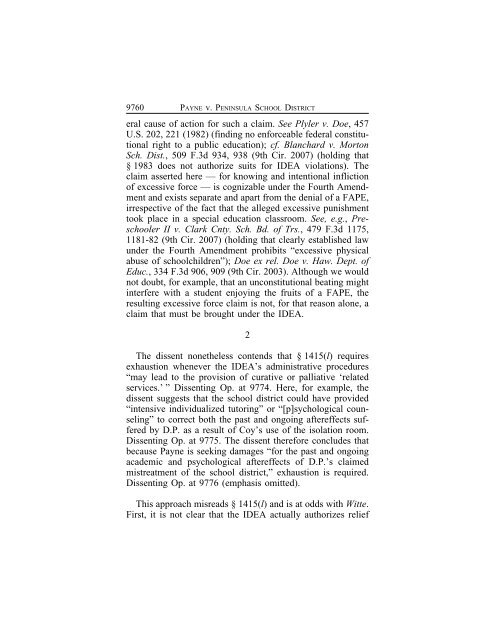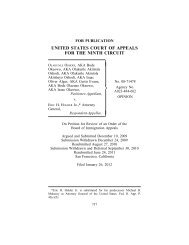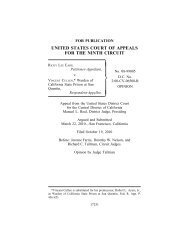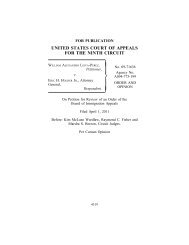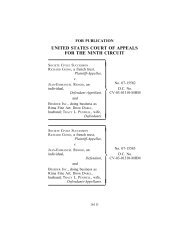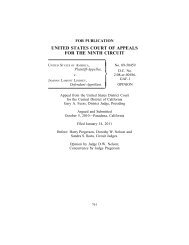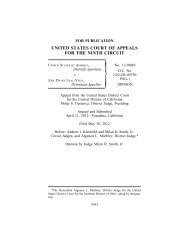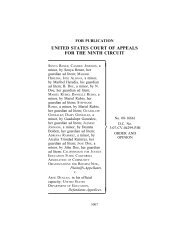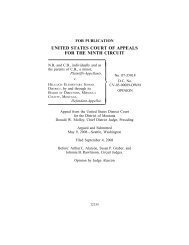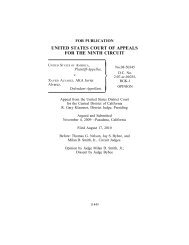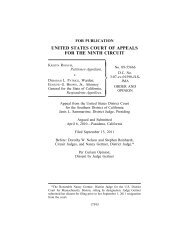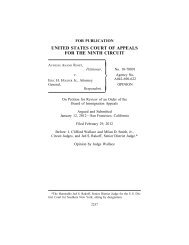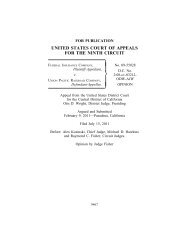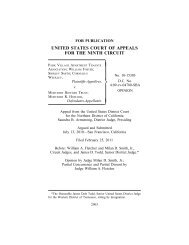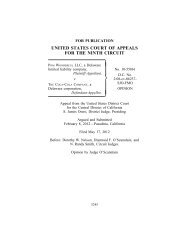UNITED STATES COURT OF APPEALS FOR THE NINTH CIRCUIT
UNITED STATES COURT OF APPEALS FOR THE NINTH CIRCUIT
UNITED STATES COURT OF APPEALS FOR THE NINTH CIRCUIT
Create successful ePaper yourself
Turn your PDF publications into a flip-book with our unique Google optimized e-Paper software.
9760 PAYNE v. PENINSULA SCHOOL DISTRICT<br />
eral cause of action for such a claim. See Plyler v. Doe, 457<br />
U.S. 202, 221 (1982) (finding no enforceable federal constitutional<br />
right to a public education); cf. Blanchard v. Morton<br />
Sch. Dist., 509 F.3d 934, 938 (9th Cir. 2007) (holding that<br />
§ 1983 does not authorize suits for IDEA violations). The<br />
claim asserted here — for knowing and intentional infliction<br />
of excessive force — is cognizable under the Fourth Amendment<br />
and exists separate and apart from the denial of a FAPE,<br />
irrespective of the fact that the alleged excessive punishment<br />
took place in a special education classroom. See, e.g., Preschooler<br />
II v. Clark Cnty. Sch. Bd. of Trs., 479 F.3d 1175,<br />
1181-82 (9th Cir. 2007) (holding that clearly established law<br />
under the Fourth Amendment prohibits “excessive physical<br />
abuse of schoolchildren”); Doe ex rel. Doe v. Haw. Dept. of<br />
Educ., 334 F.3d 906, 909 (9th Cir. 2003). Although we would<br />
not doubt, for example, that an unconstitutional beating might<br />
interfere with a student enjoying the fruits of a FAPE, the<br />
resulting excessive force claim is not, for that reason alone, a<br />
claim that must be brought under the IDEA.<br />
2<br />
The dissent nonetheless contends that § 1415(l) requires<br />
exhaustion whenever the IDEA’s administrative procedures<br />
“may lead to the provision of curative or palliative ‘related<br />
services.’ ” Dissenting Op. at 9774. Here, for example, the<br />
dissent suggests that the school district could have provided<br />
“intensive individualized tutoring” or “[p]sychological counseling”<br />
to correct both the past and ongoing aftereffects suffered<br />
by D.P. as a result of Coy’s use of the isolation room.<br />
Dissenting Op. at 9775. The dissent therefore concludes that<br />
because Payne is seeking damages “for the past and ongoing<br />
academic and psychological aftereffects of D.P.’s claimed<br />
mistreatment of the school district,” exhaustion is required.<br />
Dissenting Op. at 9776 (emphasis omitted).<br />
This approach misreads § 1415(l) and is at odds with Witte.<br />
First, it is not clear that the IDEA actually authorizes relief


